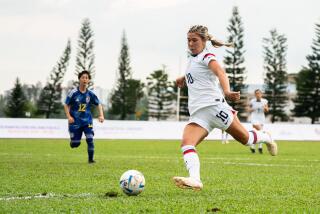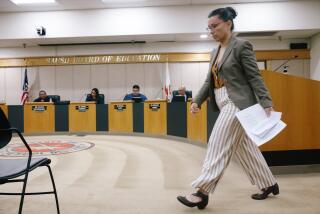Teacher, Pupil Learn From One Another, Help Deaf Students
âBarbara Boyd was tough and unpopular with the students,â Roxanne Clanin says of her teacher.
âClanin was stubborn and opinionated,â Boyd, the teacher, responds. âShe was a rebel at heart. She tested me to see how far I would go.â
Teacher and pupil clashed in a classroom at California State University, Northridge. Boyd gave Clanin a low grade on a series of poorly written essays. But, after a tearful argument, the student agreed to rewrite the papers and earned an A.
And a relationship grew between the two.
The 25-year-old Clanin, who is hard of hearing, is studying for a Special Education Teaching Credential at CSUN. Boyd, who is deaf, has become her mentor.
âShe told me I was beautiful inside,â Clanin recalls. âNo other teacher ever seemed to care about me.â
Says Boyd: âSo many her age go through an identity crisis. But unlike many of her peers, she was willing to admit she was not perfect.â
Both women are devoted to teaching the deaf and hard of hearing. Both share with such students the difficulties of living in the hearing world. They speak of telephones without devices for the deaf, problems with medical appointments, and auto emergencies.
However, their opinions regarding other aspects of being deaf vary widely, as do their backgrounds. The stories of Barbara Boyd and Roxanne Clanin, and of how they came to help each other, offer insight into the world of the deaf.
Boyd, who says she is 39 plus, has blond hair and bright blue eyes. She was born hard of hearing. Boydâs father and grandmother were deaf. She was raised on a farm in Tennessee where she plowed beside her brother, and he helped her with the kitchen chores.
The only deaf student in her elementary school, Boyd was given a front-row desk.
âMy teacher was brilliant,â she remembers. âShe knew I didnât understand the lessons well enough. She decided to write my mother a note and ask her to help me at home.â
About two weeks before that, Boyd and her cousin had been scolded for throwing spitballs in school. Boyd thought the teacherâs note was about that incident and she threw it out the school bus window.
âMy teacher asked me if I gave it to my mother. She was probably surprised that it hadnât been answered. I said, âOf course.â The teacher saw that I was about to cry. She wrote another note and sent it by mail.
âI will never forget that,â Boyd says. âI never had another evening of peace and quiet in my childhood. My mother read lessons ahead of the class with me, and taught me writing. My father taught me math and spelling. I never could have made it without them.â
Those early years left the greatest impression on Boyd; she recalls no especially inspiring teacher in college. In fact, during her first week of classes at Carson-Newman College in Jefferson City, Tenn., Boyd was called into the deanâs office and told that deaf students were given no special favors.
In 1967, she came to the National Center on Deafness at CSUN and became its Student Personnel Specialist.
Boyd remembers an earlier time when she was learning to play the organ. She was 16. Later that year, she became profoundly deaf.
âI remember what itâs like to hear music, but I donât dwell on that now,â Boyd said. âI learned sign language then and a whole new world opened for me.â
Clanin has similar memories of learning sign language. The blue-green-eyed blonde speaks of this with a raspy laugh that punctuates each sentence.
âI was finally able to communicate my feelings. For the first time, I decided it was OK to be deaf. I had the courage to tell people to stop shouting at me.â
Clanin was raised in Sacramento and is the adopted child of hearing parents. Her early years were ones of confusion, frustration, temper tantrums and crying jags.
Clanin says, âI held my breath so long and so well that my grandmother dangled me by my heels to make me breathe.â
When she was five, Clanin was diagnosed as hard of hearing and fitted with hearing aids. She says her parents were glad to finally know what her problem was. She recalls being glad that she didnât have to move right up close to other kids to hear. She eventually learned to read lips and managed fairly well.
âI had many friends in high school,â she says. âBut there was so much going on around me that I didnât understand. After I broke up with a boyfriend, he confided to a mutual friend that he thought I was dumb.â
Later, Clanin attended American River College and California State University, Sacramento before enrolling at CSUN.
Both women speak--âvoicingâ as it is called in the deaf world. Boyd talks with a Southern drawl. She prefers to use a sign-language interpreter when communicating with the hearing. Clanin prefers to depend upon lip reading and hearing aids.
Yet, Clanin is critical of those deaf people who try to pass themselves off as hearing.
âThey donât accept being deaf,â she says.
And she is adamant about being deaf: âIf there were an operation for a minimum amount of money that would make the deaf people I know hearing again, most of us would refuse. I have great deaf friends and a good life. Why should I change anything?â
Boyd has a different view.
âI donât think of life as consisting of two worlds,â she says. âThe hearing and the deaf are one world. Some people hear, some are deaf. Some people sign, some voice. I have deaf friends and hearing friends.
âI understand Claninâs desire to remain in the deaf world, but remember Iâve heard music,â she adds.
Boyd speaks of her confrontation with Clanin as a âbreakthrough.â
âBy the end of the talk, we were both crying,â she recalls.
The results of the talk--Claninâs enthusiasm to teach deaf children--has reaffirmed one of Boydâs basic beliefs about teaching.
âNo matter how good I am, no matter how perfect my lessons are, someone will not like me, someone will not respect me. The day I accepted that fact is the day I became a real teacher. It was then I decided I would go into the classroom and give my best.â
In May of 1986, Clanin completed an eight-week student teaching assignment in a normal hearing class. She admits that she has a lot to learn before she steps in front of her own class.
âI was so scared of those kids,â she says. âThey all spoke at once. They did some whispered cheating, too.â
But, she is optimistic about the future.
âThe kids were so enthusiastic,â she says. âI want to get close to kids. Theyâre so open to the world. I want to give them the self-confidence I took so long to develop.â
As Boyd can tell you, that isnât always so easy.






